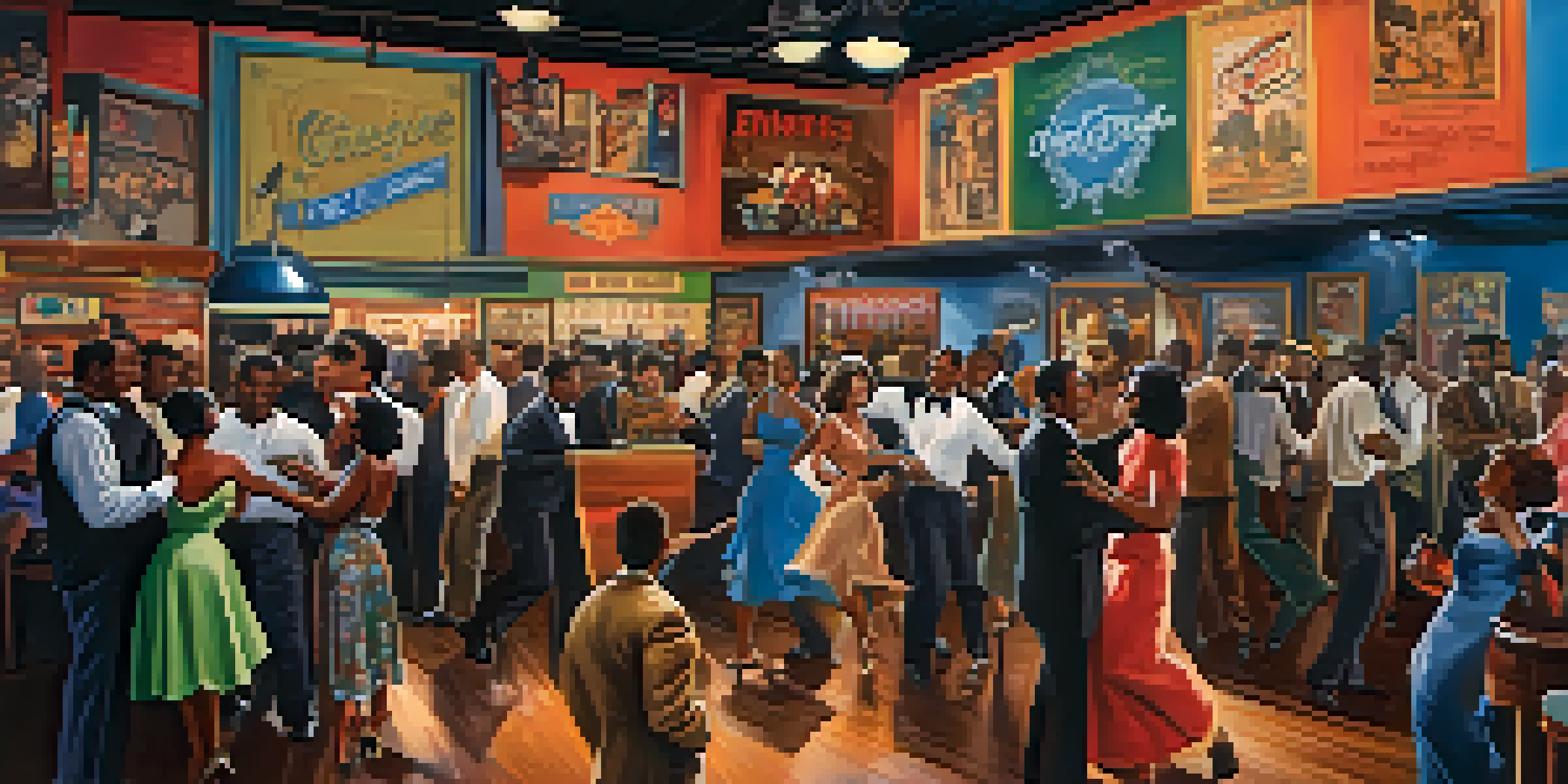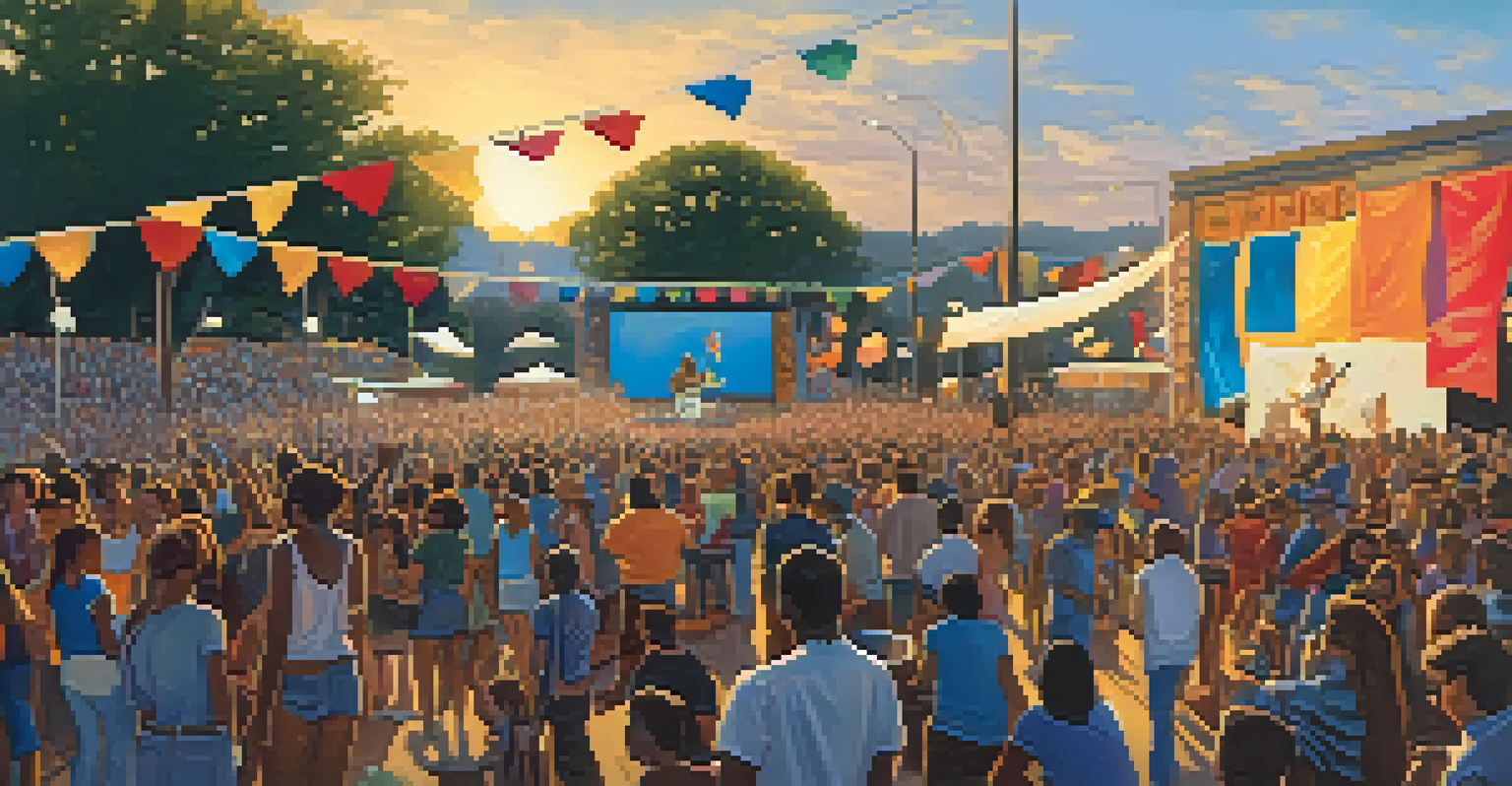The Global Journey of Blues: Roots and Cultural Impact

The Origins of Blues: A Deep American Root
Blues music has its roots deeply embedded in the African American experience in the Deep South of the United States. Emerging in the late 19th century, it was shaped by the struggles and stories of African Americans, combining elements of African musical traditions with European influences. This unique blend gave birth to a sound that was raw, emotional, and deeply resonant with the human experience.
The blues is a low-down achin' heart music.
The early blues artists often performed in juke joints, a term for informal bars or clubs, where the music was a form of expression and a way to connect with others. Songs reflected the hardships of life, such as poverty, love, and loss, making the genre not just entertainment but a vital form of storytelling. This oral tradition laid the groundwork for the blues as a powerful vehicle for cultural expression.
As the genre evolved, it began to gain popularity beyond the African American communities, paving the way for its influence in mainstream music. The storytelling aspect of blues provided a relatable narrative that transcended racial and cultural boundaries, capturing the hearts of diverse audiences.
The Evolution of Blues: From Delta to Chicago
Blues music underwent a significant transformation as it moved from the rural South to urban centers like Chicago in the early 20th century. This migration, largely driven by the Great Migration, saw many African Americans move north in search of better opportunities, bringing their musical traditions with them. In Chicago, the blues became electrified, leading to a new, vibrant sound that incorporated amplified instruments.

Artists like Muddy Waters and Howlin' Wolf played a pivotal role in this evolution, introducing a more robust and energetic style that appealed to the growing urban audience. The Chicago blues scene, characterized by its use of electric guitars and harmonicas, became a defining moment for the genre, influencing countless musicians and setting the stage for rock and roll.
Blues Origins: A Cultural Blend
Blues music emerged from the African American experience in the Deep South, combining African musical traditions with European influences.
This urban blues movement not only transformed the sound but also broadened its appeal, allowing it to reach a wider audience. The fusion of blues with other genres, like jazz and rock, marked a significant turning point, showcasing the adaptability and resilience of the music.
The Global Spread of Blues: A Cultural Ambassador
As the blues evolved in America, it caught the attention of musicians and fans around the world, becoming a cultural ambassador for American music. By the mid-20th century, blues had transcended its American roots, with international artists embracing the genre and infusing it with local styles. This cross-cultural exchange enriched the blues, leading to unique variations in countries like the UK, France, and Australia.
Blues is a feeling. It's a way of life. It's a way of expression.
British musicians, notably, were heavily influenced by American blues artists, leading to the British blues movement of the 1960s. Bands like The Rolling Stones and The Yardbirds drew inspiration from blues legends, introducing the genre to a new, eager audience in Europe. This reciprocal relationship helped to solidify the blues as a global phenomenon.
Today, the blues continues to inspire musicians across continents, demonstrating its universal themes of sorrow and resilience. Festivals celebrating blues music can be found worldwide, showcasing a diverse range of interpretations and styles that honor the genre's rich heritage.
Blues and Social Change: A Voice for the Voiceless
Throughout its history, blues music has served as a powerful voice for social change, addressing issues such as racism, inequality, and injustice. The lyrics often reflect the struggles faced by marginalized communities, making blues not just a musical genre but a form of activism. Songs like 'Strange Fruit' by Billie Holiday poignantly highlighted the horrors of racial violence, leaving a lasting impact on listeners.
The genre played a significant role during the Civil Rights Movement, providing a soundtrack for the fight against oppression. Artists like B.B. King and Nina Simone used their platforms to raise awareness and inspire action, blending music with messages of hope and resistance. This connection between blues and social change illustrates the genre's profound cultural significance.
Blues as a Voice for Change
Throughout its history, blues music has served as a powerful voice for social change, addressing issues like racism and injustice.
As contemporary artists continue to tackle social issues through their music, the legacy of blues as a catalyst for change remains strong. The genre's ability to adapt and respond to societal challenges ensures that it remains relevant, resonating with new generations of listeners.
Blues Subgenres: Diversity within a Single Genre
One of the fascinating aspects of blues music is its diversity, with various subgenres emerging over the years. From Delta blues, characterized by its slide guitar and raw vocals, to the sophisticated sounds of jazz blues, each subgenre tells a different story. These variations reflect the geographical and cultural influences that shaped them, showcasing the genre's adaptability.
Other notable subgenres include country blues, known for its traditional acoustic roots, and blues rock, which fuses elements of rock music with blues. Artists like Eric Clapton and Stevie Ray Vaughan exemplify this blend, bringing the blues to new audiences while staying true to its foundational elements. This diversity allows blues to continually evolve, attracting listeners from different backgrounds.
The ability of blues to branch into various subgenres highlights its universal appeal and the creativity of musicians. Each subgenre offers a unique listening experience, ensuring that blues remains a vibrant and dynamic part of the global music landscape.
The Legacy of Blues: Influencing Modern Music
The legacy of blues music is profound, having laid the groundwork for many modern genres, including rock, jazz, and hip-hop. Iconic rock bands like Led Zeppelin and The Doors have cited blues artists as significant influences, showcasing the genre's far-reaching impact. Even contemporary pop and R&B artists often incorporate blues elements into their music, demonstrating its enduring relevance.
Moreover, blues has inspired countless musicians worldwide, leading to the creation of new styles and interpretations. The genre's emotional depth and storytelling prowess continue to resonate, encouraging artists to explore their own experiences through music. This ongoing influence speaks to the timeless nature of blues, proving that its essence is woven into the fabric of modern music.
Legacy of Blues in Modern Music
The legacy of blues continues to influence modern genres, including rock, jazz, and hip-hop, showcasing its enduring relevance.
As we listen to today's music, it's essential to recognize the roots of these sounds in the blues. The genre not only shaped the past but continues to inspire future generations of musicians, ensuring that its legacy will live on.
Celebrating Blues: Festivals and Cultural Preservation
To honor the rich history and cultural significance of blues music, numerous festivals and events celebrate its legacy around the world. From the Chicago Blues Festival to the New Orleans Jazz & Heritage Festival, these gatherings showcase both legendary artists and emerging talents, fostering a sense of community and appreciation for the genre. They serve as a reminder of the blues' roots while highlighting its contemporary evolution.
Additionally, organizations dedicated to preserving the history of blues work tirelessly to archive recordings, promote education, and support musicians. Initiatives like the Blues Foundation and local cultural centers play a crucial role in ensuring that the stories and sounds of blues are not forgotten. Their efforts highlight the importance of safeguarding this cultural treasure for future generations.

By participating in festivals and supporting preservation efforts, we contribute to the ongoing story of blues music. Celebrating its past and present not only keeps the genre alive but also strengthens the connection between communities and the rich tapestry of their musical heritage.